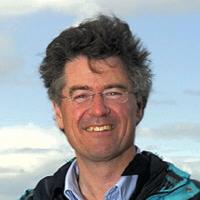PhD, Earth Sciences (1988) Australian National University
Bsc (Hons), Geophysics and Geology (1984) University of Tasmania
Bsc, Physics and Mathematics (1982) University of Tasmania

Biography
Nathan Bindoff is Professor of Physical Oceanography at the University of Tasmania and a Chief Investigator in the ARC Centre of Excellence in Climate System Science.
Prof Bindoff is a physical oceanographer, specialising in ocean climate and the earth’s climate system, with a focus on understanding the causes of change in the oceans.
He was the Coordinating Lead Author for the oceans chapter in the Intergovernmental Panel on Climate Change (IPCC) 4th and 5th Assessment Reports (AR4 & AR5). Prof Bindoff and colleagues documented some of the first evidence for changes in the Indian, North Pacific, South Pacific and Southern oceans and the first evidence of changes in the Earth’s hydrological cycle from ocean salinity.
His most recent work is on documenting the decline in oxygen content of the oceans. He has also worked in the Antarctic, to determine the total production of Adelie Land Bottom Water formation and its contribution to Antarctic Bottom Water Formation and its circulation. His group has contributed to the development of some of the largest and highest-resolution model simulations of the oceans for the scientific study of mixing in the oceans. He contributed to the IPCC’s winning of the Nobel Peace Prize in 2007, shared with Al Gore, and is now a Coordinating Lead Author of the Detection and Attribution chapter in the IPCC’s AR5.
His current interests are primarily in understanding how the changing ocean can be used to infer changes in atmosphere and whether these changes can be attributed to rising greenhouse gases and for projecting future changes and its impacts on regional climates.
He led the Climate Futures project for the study of impacts of climate change on Tasmania. Professor Bindoff has served on 14 international committees, been the invited speaker at 22 conferences and workshops and co-chaired two workshops. He was guest editor on two special volumes of Deep Sea Research, and convened the Oceans session of the Climate Change Congress, Copenhagen, March 2009. He has published more than 100 scientific papers, 7 book chapters and 8 conference papers and 43 reports. He has a H index of 39 and greater than 10000 citations (Google Scholar).

